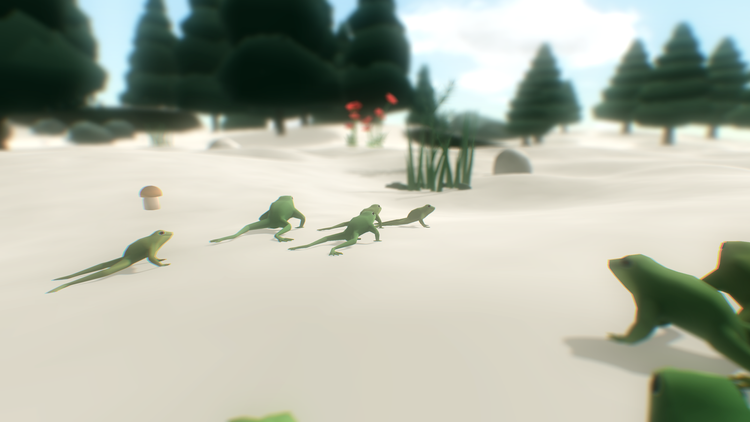Tomb Raider writer Rhianna Pratchett on why every kill can’t be the first and why she hoped to make Lara Croft gay
As EA’s recent “Full Spectrum” event showed, players and developers alike have begun to realize that videogames could do a much better job handling diverse identities than they have in the past. How the game industry and its core audience of consumers begins to do so, however, is another question.
Few people have as much experience wrestling with precisely this question as Rhianna Pratchett. In the second part of our conversation about her work on the new Tomb Raider, I spoke with Pratchett about the cultural baggage that Lara Croft carries with her into any new game and why making “men with boobs” is an important first step for game developers to take.
KS: Whether or not you want to address a gender issue head on, when you’re dealing with a character as prominent as Lara Croft you’re inevitably faced with that question, no?
The question of: are we making her vulnerable because she’s female?
Well I think another question that game critics and players haven’t resolved for themselves is how to best represent characters who, in the real world, would be subjects of some type of systematic social oppression—be it sexism, racism, classism, homophobia. A question that came up last week at EA’s “Full Spectrum” conference was whether LGBT characters should just be shown as the most ass-kicking protagonists possible. Or should developers create games that actually speak to the experience of what LGBT subjects go through in their lives.
And what did they say? (Laughs)
The panelists kind of went back and forth on the issue. But BioWare’s Matt Bromberg was very open when he told me: “It’s hard.” I imagine that if a studio of BioWare’s caliber, or Crystal Dynamics character, made a gay character that wasn’t immediately accepted in the game world that would give rise to its own controversy.
There was a blog post—it was referenced in a GameSpot article “Fear of a Woman Warrior”—by a developer who was talking about the fear he had of creating anything outside white male characters [laughs] lest he be accused of racism or sexism. I think there is actually a genuine nervousness amongst developers about straying outside those familiar grounds. That is why we get so many dudebros in suits—or Whitey McStubbly, as I call him—repeated over and over again.
That’s the familiar ground. But it’s not an accurate representation of gamers, it’s not even an accurate representation of developers! Developers themselves are much more diverse than the characters. Whenever anybody talks about a need for more female protagonists I say: “There’s a need for more female protagonists, but there’s a need for characters of different ethnicities, ages, sexual orientation, ability, et cetera.” We are very narrow when it comes to our characters.
But also you’ve got a situation where female characters do get scrutinized more than male characters do, and in some ways can be seen as holding a banner up for female characters. A lot gets heaped on their shoulders. Lara Croft gets a lot more scrutiny than Nathan Drake does, as a female. Nobody talks about how well Nathan Drake is representing men, or male characters in games.
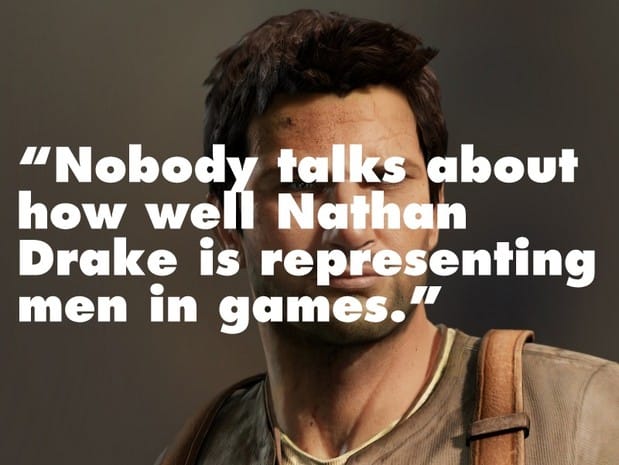
Right, Nathan Drake is not seen as the voice of all white men.
I’ve dealt with it a fair bit in the past—Nariko in Heavenly Sword, Faith in Mirror’s Edge. I never set out to just write female characters, these projects just came my way. I’ve written male characters before, and my next game is a male character as well. There’s a lot of scrutiny of female characters, so I imagine that there’d be a lot of scrutiny of any other ethnicity or sexual orientation. But you have to take the risks! There have to be the people that do take the risks. And it probably does have to be the big guys.
I remember reading an article that said that the female characters in Aliens: Colonial Marines were sort of an afterthought. That’s just like…have you watched Aliens?!? Women are an integral part of the colonial marines! You take Ripley out of the equation. Aliens and Terminator, as franchises, both pushed forward female characters in the sci-fi space in a really interesting way.
I see the examples that you’re talking about, these sci-fi movies with strong female leads. But one of the interesting things about games, one of their real creative and artistic possibilities as I’ve always understood it, is their ability to cultivate empathy in the user. From a broader social justice perspective, do you think that just putting marginalized characters in the role of the badass, ass-kicking protagonist is the fullest response to making more diverse games? Or is it some sort of stop-gap solution?
I don’t think it’s the most fulfilling response necessarily. But I think it’s probably the first response. I mean, we’re not even getting too much of the first response! It’s the “male character with boobs” type approach.
Certainly with Lara, I wanted to make a human story. But I never wanted to forget that she was female either. And, I mean, certainly the way she reacts to things could be said to be more female as a reaction. I’m not talking about being scared, or being vulnerable. But the way she interacts with other characters, her friendship with Sam in particular…you wouldn’t see a male character holding the hands of an in-pain male character or hugging a dying male character.
I didn’t want to just make Lara a male character with boobs.
I don’t know, Dom and Marcus were pretty tight-knit at certain points.
[Laughs] You don’t get it that often. She’s got…[pause]. I think she’s got a little bit more female empathy, one could suggest. And certainly her friendship with Sam, especially when it’s fleshed out in the camera sequences, it’s quite a female friendship. It’s quite sort of playful and fun and girlish. And that underlines Sam’s importance in Lara’s life. They both have their differences, but they’re both ambitious women in their field. And they care a lot for each other. Maybe with a female character it’s easier to show those kind of emotions.
I mean, I didn’t want to just make Lara a male character with boobs. It’s always kind of a…it is a human story at heart. But there things—the language she uses, or the way that she interacts—that could be said to be more feminine. I’m very much not talking about her sense of vulnerability or being scared. That again has been rolled out as: male characters aren’t shown as being scared or vulnerable, why should female characters? Well, just because it hasn’t been done with male characters doesn’t make it wrong! It’s probably more of a problem of the way we depict male characters.
I guess I never understood the rush to criticism if you make a female character that is vulnerable, that is openly scared of some situations. I never got why that was such a big deal, because when I think of the history and development of shooters in particular, it seems like the entire form has grown into this huge market around a common male fantasy. Young men were historically the target demographic—even if they may not be anymore—that these kinds of games were designed for, marketed to, and ultimately played by. I wonder if we want to make a more diverse host of games that are open to more types of identities, if that going to eventually produce a more diverse set of games themselves rather than just shooters featuring “men with boobs.”
Like I said, getting more diverse protagonists is important, and just getting them in there will be the first step. But I do think it is a bit disingenuous to have a gay character and then not speak to that. It’s kind of like having a straight character who happens to like people of the same gender. Exploring something about what it means to be a gay character, bisexual character, transgender character, in games, that would create some interesting stories. I’m not sure we’re there yet. But I think getting those representations into games is the first step. Once we’re more comfortable with that, actually speaking to those issues a little more broadly will be possible.
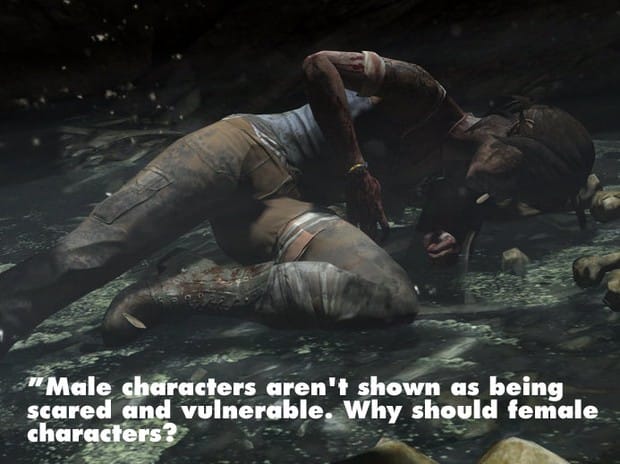
But also getting more writers in the process, and people that aren’t afraid to write about characters who aren’t them. That’s what writers do! You’re always exploring people who aren’t you. Once you get your head around it, you can feel comfortable in that space. So I think that once more writers and narrative professionals get involved, the more comfortable they will be to write different and diverse characters.
And like I said, from a narrative standpoint we didn’t completely ignore that Lara is female. But we didn’t sort of yell it out either. It wasn’t all about that—being female. But we did bring it in, because it’s part of who she is. She is a young woman, so we wanted her to feel like a real young woman. That was one of the problems in the past with old Lara. It became all about her gender, particularly about her boobs. There is more to gender than what you have on the front of your chest. [laughs]
I’d love to see more of that. It’s a shame that developers don’t do this. Are they just really nervous about doing anything that’s not men? So I think: Ok, this is where writers can help. Because we have to! Otherwise it would be Mary Sues as far as the eye can see. But like I said, first step: getting them in. Second step: exploring that more once we’ve got them. Ideally if we get that in, we can explore it more. But it has to be right for the game and the experience.
Do you feel any differently when you approach writing a character when you know that they’re female or male? Grant Morrison famously said that he had written his version of Batman as a gay man, even though he never made that particularly clear in the series itself. Do you ever have those kinds of little sub-narratives that you establish for yourself even if you don’t say so explicitly?
Yeah, I mean…[pause]. Sometimes, though I can’t think of a specific example. I’ve seen a number of threads about Lara’s relationship with Sam that suspect there’s something more going on under the surface. With Faith as well. I’ve seen an entire essay about how I have a “gay agenda.” That was an interesting take on it, and not necessarily something that I’d considered.
There’s part of me that would’ve loved to make Lara gay. I’m not sure Crystal would be ready for it! But we’ve not spoken about it directly, either. Who knows what the future might hold? It is a bit of a minefield.*
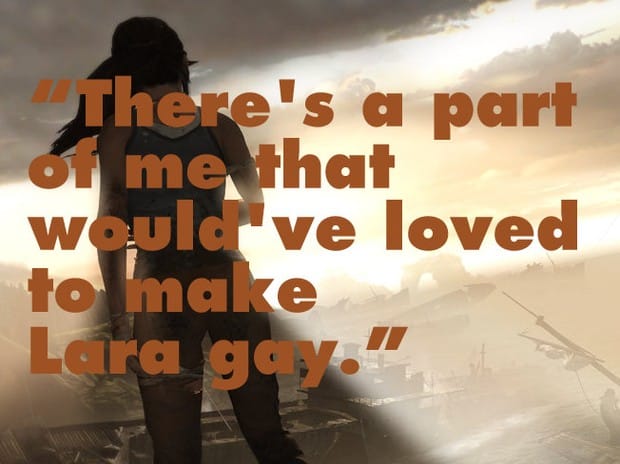
It’s always difficult to know how to phrase things. Because, certainly when talking about things like the controversy in Tomb Raider where they really break down the language that you use. I’m very keen to make the point clear…
Yeah, we need to be braver about these things in general, really. In that same “Woman Warrior” article, the writer was talking to the art director on Gears of War, who was saying that it would be very difficult putting a female up front and center because female-lead games do not sell as well as male-lead games. But they’re not given the marketing support that male-lead games are. I certainly hope that Tomb Raider will turn the tide on that, and get people thinking about characters more.
Although I never saw Faith as a gay character, I had this sort of underlying thing that Celeste, who was another female character, might possibly be that way. There wasn’t a necessity to explore it in the game. But, again, it’s building the iceberg.
So yeah, that’s the best way I can answer that. It would be great to build more diversity in. I don’t think we’re going to get everything in a rush, but we have to take those kind of small first steps.
Another thing that came up at the EA summit was the fact that companies face this problem from two sides. On one hand, they have to deal with potentially obstinate parts of what’s understood to be “gamer culture” today.” But on the other hand, how can you expect gamers to be accepting if a studio isn’t willing to create these kinds of characters in the first place? Where does responsibility lie? Obviously not solely on one group or the other.
And also it’s where the positive lies as well. I’ve seen arguments about how a character cannot be deemed positive if, for whatever reason, they kill a lot of other people. Certainly with a combat-heavy game, that’s difficult to do. There’s a lot of weight on a character like Lara’s shoulders. I do feel that. And I do feel responsible for trying to create the best most interesting character—folding her gender into that, folding her background, her experiences, into that part and parcel.
Tomb Raider raised a lot of comparisons to the Uncharted series, and both games show that tension of having very life-like and ordinary human characters killing hordes of bad guys. This is a constant tension, and I don’t imagine that any one game developer has the magic bullet to just solve it. But how did you work around this? Or do you even see that as a tension that needs to be resolved?
It is very difficult. I think it is all about the suspension of disbelief that you have when going into a game. It’s very difficult to keep that good affable character when they’re having to slaughter loads of people. But what we tried to do with Lara was at least have the first death count. As you say, she’s uncomfortable with having to do what she needs to do. Those feelings start to bubble to the surface, and she does sort of push them away because she knows she can’t think about what she’s doing. It will incapacitate her if does.
But, you know, it does bubble up. Mathias refers to it as well at the end. So what we tried to do there is give her a knowing-ness about what she’s doing. Certainly with the first kill having a lot of impact. She went quite a long time without having a weapon. Then there was the bow, and then quite a long time without a gun. There is lots of kills after that. But you can’t play the same card over and over again. Every kill cannot be like the first kill.
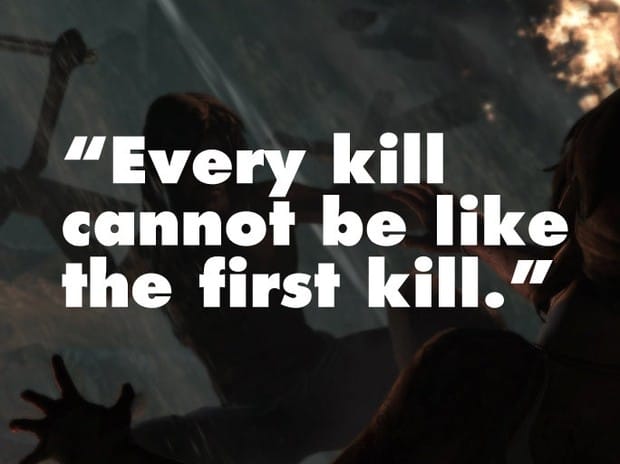
A lot of games that build suspense around the first kill. But then five minutes later, you’re mowing down bad guys like a champ. I did notice that Lara remained unseated throughout the entire experience when I was playing Tomb Raider.
It’s about balancing the needs of gameplay with the needs of narrative. The needs of narrative don’t always trump the needs of gameplay. In fact, it’s usually the other way around. And so I’d say from a narrative perspective, we would have liked the ramp-up to be a bit slower. But, you know, there are other factors to be considered! When players get a gun, they generally want to use the gun. We were brave in going such a long time without giving players a gun in a game where you end up doing a lot of shooting. We tried to innovate a little bit, but narrative can’t always win. Ideally if you can find a sweet spot, that’s great. But sometimes combat, or gameplay or whatever, has to win out.
I try to be diplomatic about these sorts of issues, particularly when writing about an industry that doesn’t seem to have any Westboro Baptist Church-like figureheads screaming about how we need to get the fags and queers out of games or something like that. It feels like one of those areas where there’s not a clear bad guy to which we can direct all of our attention.
I think we’ll start to see more focus on character and characterization moving forward. Because it is a bit of an undercooked area. There is so much that we can do in that area. Artists spend months working on the details of…[pause] bro marine’s kind of uniform. You need to spend months working on his character as well! What’s under the big space marine armor needs to be important to developers, because it’s clearly important to players. Not every player cares, but enough do to actually make it worth the time investment in that.
I just thought: “I’d love to make Lara gay!” That’s probably going to be your headline.
You know, we didn’t actually touch on Lara’s sexuality in the game. She kisses Alex on the cheek. He has a crush on Lara, but it’s actually a sort of respect crush as much as anything else! It’s a sweet crush, which makes that moment more poignant. But people have talked about Lara’s boyfriends and stuff like that, and I’m like, “No, no, I don’t want that to be part of it!” This is about her. I didn’t feel like a boyfriend or that side of things fit into it. But I do like the fact that people speculate about what Lara’s relationship to Sam might have been, or that people speculate about Faith and Celeste. It’s good that people care enough about those characters to think about those sorts of things.
I remember speaking with another games writer about this actually, because I asked him if he ever remembered falling for a character in a game. This is something that’s always kept games apart from other types of art for me—I don’t feel like game characters have ever seduced me really. And I don’t mean that in some immediately sexual way, a book like Lolita is structured around the narrator seducing the reader to believe his version of events. Game characters often come across as sort of asexual, and I wonder if that has to do with that urge to keep the protagonist as faceless as possible to avoid disagreements with the player. How do you take that next step, to make characters that are fleshed out that way?
We also have a very straight version of love. It’s usually boy-girl love. Even moving something outside that is something I explored in a couple of stories in Mirror’s Edge and particularly in Heavenly Sword because you played as Kai as well and learned more about her story. There was love between Nariko and Kai, and you could really feel it. It was a sisterly love, a familial bond.
There are different types of love. And I think in games we don’t really stray too much outside of girl-boy. There are things that can be done with sisterly love, brotherly love, paternal, maternal love. That was explored a little bit in BioShock 2, which I liked.
The straight boy-girl thing has been typified by the damsel in distress. It’s always the male character rescuing the female character. It was interesting that with a female [protagonist] like Lara rescuing a female, people sort of projected that there was more going on to that relationship because of that.
There’s just so much to be explored, if we could just be a little bit braver about our characters! Because gamers can take it, I think.
Clarification: Rhianna and Crystal Dynamics did not discuss Lara’s potential sexual orientation during the development process.


